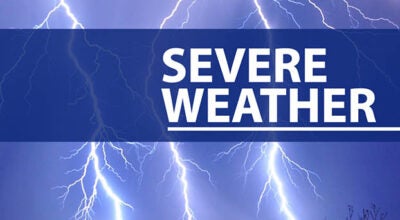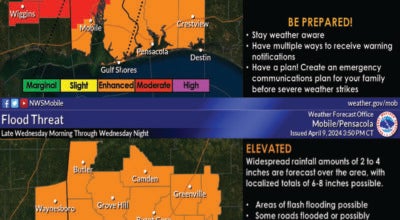Comments raise questions about use of social media sites
Published 3:32 pm Monday, May 17, 2010
Melissa Knupp couldn’t believe what she was reading. A printout of comments from a local teacher’s Facebook page showed what she believed were unprofessional comments —including what she said were derogatory terms for special education students.
“As an aunt of a special needs child, I take offense,” Knupp said. “I would be offended regardless. … I would not want my nephew around anyone who feels the way she does about her job and the children.”
The Facebook comments from the teacher’s page — which was public but has since been made private — have circulated among many parents and teachers in the community.
The teacher in question is no longer in the classroom; school officials could not comment on the reason.
But the incident raises questions about how teachers — or any professionals — can keep their public and private lives separate online, if at all.
Keeping it professional
University of Alabama public relations professor Karla Gower said she believes all professionals, not just teachers, should be careful about what they post online, especially on social media sites.
“Our professional and private lives have become blurred,” Gower said. “And employers are increasingly looking for those two lives to be the same. Employers look at your Facebook page to see what you are ‘really’ like. I always tell my students that those pictures of them at a party or in a skimpy outfit, however innocent it may have been at the time, take on new meaning on Facebook. Employers may not hire them or may let them go when they see those things. Employers are afraid the behavior might impact your job or impact their reputation some how.”
How can people balance their professional lives with their private lives when using social networking? Gower said there are no easy answers.
“In public relations and marketing circles today, people talk about personal branding,” she said. “So I tell my students who are getting ready to go into the job market to Google themselves and make sure their ‘brand’ — their personality and image — is consistent across all of their social media sites, and to check those sites periodically because as in Facebook’s case, someone else — even one of your friends — could have posted something unflattering about you on your site.”
Role models
Teachers in Alabama do have a code of ethics passed by the state board of education, but it’s not listed in the state’s administrative code, so it doesn’t have a lot of teeth. Two years ago, state lawmakers took up the issue in their regular session, but a bill that would have put the code into state law did not pass. Opponents — including the Alabama Education Association — said the bill was rather broad and could have been unfairly used against teachers.
Wade Perry, AEA representative in Mobile County, said his organization has worked to help educate teachers about how to use social media sites like Facebook in a responsible manner, whether that includes content or contact with students.
There have been cases in other states where teachers — particularly those who are non-tenured — have been dismissed over racy photos or other comments online.
Perry said he understands that teachers should not engage in unprofessional conduct, but there is always a possibility that photos or event comments might be posted without a teacher’s consent.
“There’s a reason we have the tenure law and fair dismissal act,” he said.
Sally Howell, executive director of the Alabama Association of School Boards, said school officials are likely to face these kinds of issues with increasing frequency as the popularity of social media sites grows.
“They should approach them on a case-by-case basis to determine what the appropriate response would be,” she said. “Sometimes personnel make mistakes in judgment.”
In some cases, Howell said, discipline can include non-renewal of a contract, especially for non-tenured teachers. No reason needs to be given in such cases, she said.
For school boards, the balance is weighing a teacher’s professionalism with his or her right to free speech.
“We do have high expectations of teachers,” Howell said. “But we have to respect their First Amendment rights.”
Still, Howell said she would advise any school official or teacher to be careful about what they say — and especially what they post online, because tone is not always easily identifiable.
“You’re in a fishbowl constantly,” Howell said. “Inferences could be drawn about context that may or may not be right.”
Dr. Vivian Wright, associate professor of instructional technology at the University of Alabama, said she believes teachers need to model responsible behavior online.
“Banning the technology is not the answer,” she said. “Instead, we must deliver consistent and ongoing messages of responsible uses of technology.”
Teachers that Wright works with in a master teacher program agree. Even interacting with students online can be risky, unless teachers engage in responsible behavior.
Cindy Dixon, who teaches English and language arts at Holt High School in Tuscaloosa, said she is friends with some of her students on Facebook — but only if they invite her.
“I am on Facebook often and the students use it for homework help and to bounce off topics,” Dixon said. “However, I am very careful. For example, I do not post questionable photos. Further, I use it to help build responsible bridges — students must constantly be reminded how to use technology responsibly. Often, if something related to technology is in the news, I use that opportunity as a teachable moment.”
Teachers can be a good example of how to use online sites responsibly, teachers said.
“Teachers are a moral compass,” said Lisa Matherson, social studies teacher at Paul W. Bryant High School. “We must model good online behavior — we are the students’ role models.”
Risky behavior
The expectation of privacy online is rarely a reality.
“We don’t have a professional/private split anymore, at least online,” Gower said. “If you want to have a ‘private’ life online, you have to use all of the privacy settings available and be very careful about to whom you give access. Of course, that takes a bit of the fun out of social media.”
The risk of making unprofessional comments exists even off the Internet, Gower said. But as the popularity of social media sites grows, the speed of sharing information grows exponentially.
“We confide in people we trust,” she said. “But there is always the possibility a ‘friend’ could breach that trust and share what we said with others. That’s why we should always be careful about what we say unless we know the person very well. The big risk online is that the information goes farther faster than we can imagine.”
Overall, Gower said any professional should realize that what they might think is private — even if they carefully police their social media site settings — is not always so online.
“The lessons for any professionals are to remember that online is not private. Social media outlets are very public channels,” she said. “And that our professional and private lives are the same thing now.”






